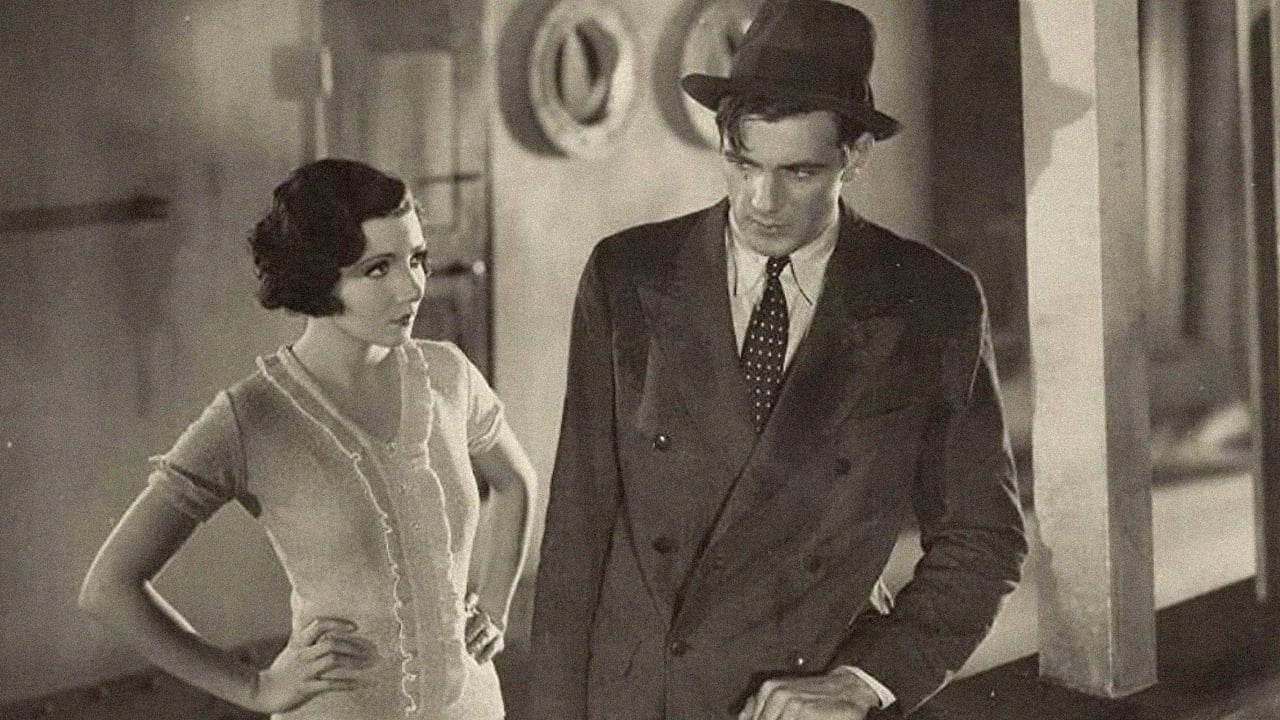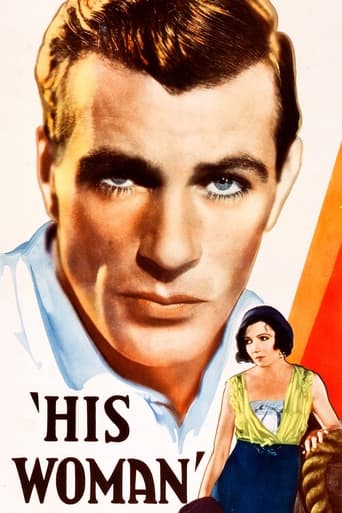

Well, this movie is certainly something. I'm just not sure what.Gary Cooper plays the hardbitten captain of a merchant ship; while docked at a South American port someone leaves a caucasian baby in his boat. Cooper plans to take it with him to the US, he just needs someone to take care of it on the voyage. Enter Aloysius (Hamtree Harrington, what a great name) and Mark (Sidney Easton), his two African-American stewards – bumbling caricatures who speak in the phony "black American" patois acceptable in early Hollywood. IE, lots of "yassirs" and bug-eyed expressions of shock. Claudette appears as a seaport "entertainer" who wants to get back to NYC; she comes aboard as the baby's surrogate, employing skills she didn't realize she had. Along the way the baby instills in her the desire to "straighten up," and her and Cooper fall in love to boot. Only, Claudette has a shady past and it seems that every other mate on the ship has had her at one dingy seaport or another – all of them except for Cooper, that is, who despite being hardbitten is also a little too naïve. He buys Claudette's "my parents were missionaries who died and now I'm all alone" story and gets ruffled if anyone doubts her, ruffled to the point of fighting one of his men and knocking him overboard. It all comes to a head in NYC with a truly underwhelming courtroom scene.Really, the whole movie is underwhelming. I mean, the film opens with a stock shot of a merchant vessel plying through the water, then a cut to the deck, and Gary Cooper ambles his way across it. THAT'S how the movie begins, no fanfare, no buildup, just another day at sea with Gary Cooper. Gary Cooper and his two racial stereotype crewmembers, that is; I have a theory that Malcolm X saw this film as a boy and it set him on his way. For truly this movie is offensive. I'm an open-minded guy and don't get offended easily, but this film goes out of its way to shoehorn every black stereotype into the characters of Aloysius and Mark. They are presented as incompetent nitwits who exist only to bulge their eyes and mutter banalities – in between loud prayers to "Gawd," that is.And it's not just that. Whole chunks of this film are composed of nothing more than a baby crying. Minute after minute evaporates as the baby screams and bawls, with various characters attempting in vain to placate it. In addition the movie is very static, paced so leisurely that it appears to be out for a Sunday drive. Cooper can do little to save it; his character is a vapid sort, and it's obvious he had a hard time reckoning the polar characteristics with which he's been foisted: we're supposed to believe his character is a non-nonsense sea captain who commands respect in his grizzled men, yet at the same time he's so naïve as to buy whole-hog Claudette's obviously fake background story. As for Claudette – well, what can you expect: she's as good as ever. Her role offers her a bit more room and she does a good job portraying the whole "bad girl goes good" angle. This early in her career she still has that waiflike look – big Betty Boop eyes, fragile body. I swear this lady drank some sort of elixir – just compare how she looks in this film to say "Sign of The Cross," released the following year, or even "Cleopatra," from three years later. It's like she went through a second puberty.Production-wise the movie's underwhelming as well. Don't expect the usual Paramount opulence here. Rather than a nice portrayal of a madhouse South American bar early in the film, the sets are mostly spartan-looking cabins within Cooper's ship, or the equally-austere deck. Once the ship gets back to New York we're only graced with a few stock shots of the city, and from there to a basic office room for the trial. The direction, too, offers little to appreciate; the whole thing, from beginning to end, is as basic as bread.Special note: This film contains one of the worst line readings I've ever had the pleasure to hear. I'm talking "Ed Wood production" bad. When Claudette's back with her high-living galpals in NYC, all of them sitting around in negligees with their legs dangling in pure Pre-Code lasciviousness, she gets ribbed by them for falling in love with Cooper. Try as they might, the girls can't get Claudette to revert to her old ways. One of the galpals, a pretty blonde, shakes her head and says, "Well, I just give up." It is, by far, one of the worst deliveries of a line EVER.
... View MoreHis Woman is a story of lonely tramp freighter captain Gary Cooper who while in port in Asia has a white baby abandoned on the rowboat he uses to get to and from his freighter with a note by a despondent mother. Gary takes to the little guy, but he knows full well he'll need a woman's touch in tending to him. And not just any woman.His order to dive owner Douglass Dumbrille, send me over a woman, but a nice woman, not some of those who frequent your establishment. Claudette Colbert seems to fill the bill. But she's been around the track a few times though Cooper doesn't know it.When first mate Averill Harris who's seen her in waterfront dives before makes advances on her, Cooper eventually finds out though.His Woman is the kind of Victorian melodrama that might have been popular on the stage 35 years before. Studios were still digging up these old plots as vehicles for their films. Cooper comes across as stupidly naive. I mean this is a sailing man, a man of the world, who did he think he was going to find in the places he hangs out, Florence Nightingale.And Colbert comes across too much as a lady. Someone like Joan Crawford would have been perfect for the part, but Colbert never quite convinces as a waterfront denizen.The film was shot on the East Coast and in Paramount's Astoria Studio in New York after Cooper was on extended holiday in Europe and on safari in Africa. According to the Citadel film series book, The Films of Gary Cooper it hadn't been shown on television ever because of the two Amos and Andy like black characters who were ship stewards on Gary's freighter. This was back in the Sixties, because apparently it's been seen by a couple of people to write reviews about it.The two stewards, played by a comedy team of Hamtree Harrington and Sidney Easton, were a bit much and they would indeed be found offensive by a lot of people today. So with Hamtree and Sidney and the fact it's a dated melodrama from the Victorian age does not bode well for His Woman.
... View MoreVeteran Sloman's long career was winding down in 1931, but he shows a steady hand in this cliché tale of a stern but naive young sea captain (Cooper) who falls for the "entertainer" (Colbert) who, desperate to escape from a South American port, bluffs her way on board as nurse for a foundling baby dumped in the ship's dinghy. Romance takes second place, however, to scenes stolen by the engagingly vivacious and good-natured baby (Richard Spiro), and by the ship's African-American servants, played in Amos and Andy-style cross-talk by Hamtree Harrington and Sidney Easton. (Journeyman director of photography William O. Steiner went on to light a number of films featuring African American entertainers.) HIS WOMAN is a respectable B movie, worth seeing for the almost exaggeratedly tall young Cooper and the detail of Colbert's tramp friends, who lounge around their shared apartment in pre-Production Code undress. Colbert's first appearance, arriving by boat at night in search of a nightclub job, and some byplay in the cantina between Cooper and dancer Raquel Davidovich, who tempts him by kissing a flower, both recall Marlene Dietrich and Cooper in the previous year's MOROCCO, suggesting Paramount may have hoped to trade on that film's success.
... View MoreNo matter what film Gary Cooper is in, he always acts and looks the same. His tall, gangling figure makes him look clumsy and awkward, and his monotone voice has no variety, range or depth of emotion. But the one thing I definitely don't believe about him is that young women fall for him. This is totally down to biased scripting.
... View More